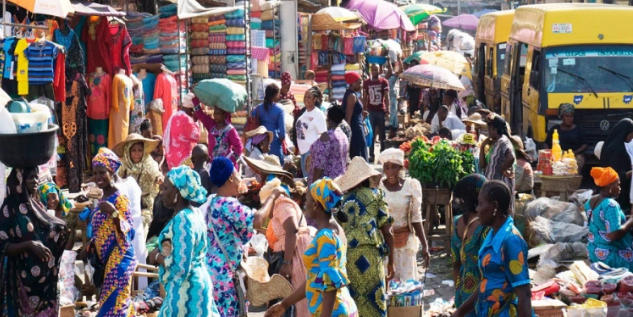Fuel Subsidy Removal reportedly pushed Nigeria’s Inflation Rate to 24.08% in July 2023.
Newsonline Nigeria reports that Nigeria’s inflation surged to 24.08% in the month of July 2023, a 129 basis-point increase compared to 22.79% recorded in the previous month.
This represents the sixth consecutive increase in the headline index this year.
This is according to the recently released Consumer Price Index (CPI) report for July 2023 by the National Bureau of Statistics (NBS).
The significant jump is following the complete removal of petrol subsidies and the unification/devaluation of the official exchange rate.
Notably, on a month-on-month basis, the headline inflation rate stood at 2.89% in July which was 0.76% higher than the rate recorded in June 2023 (2.13%).
In terms of contribution to the year-on-year inflation, Food and non-alcoholic beverages (12.47%) contributed the most, followed by housing water, electricity, gas and other fuel (4.03%), and clothing and footwear (1.84%).
Food inflation
The Food inflation rate rose to 26.98% in July 2023, representing a 1.73% point increase from 25.25% recorded in the previous month and 4.97% points higher than 22.02% recorded in the corresponding period of 2022.
- On a month-on-month basis, the Food inflation rate in July 2023 was 3.45%, this was 1.06% higher compared to the rate recorded in June 2023 (2.4%).
- The average annual rate of Food inflation for the twelve-month ending July 2023 over the previous twelve-month average was 24.46%, which was a 5.71% points increase from the average annual rate of change recorded in July 2022 (18.75%).
- The rise in Food inflation on a year-on-year basis was caused by increases in prices of oil and fat, bread and cereals, fish, potatoes, yam and other tubers, fruits, meat, vegetable, milk, cheese, and eggs.
Core inflation
The “All items less farm produce” or Core inflation, which excludes the prices of volatile agricultural produce stood at 20.47% in July 2023 on a year-on-year basis; up by 4.41% when compared to the 16.06% recorded in July 2022.
- On a month-on-month basis, the Core inflation rate was 2.11% in July 2023. It stood at 1.77% in June 2023, up by 0.34%.
- The average twelve-month annual inflation rate was 18.84% for the twelve-month ending July 2023; this was 4.31% points higher than the 14.53% recorded in July 2022.
- The highest increases were recorded in prices of passenger transport by air, passenger transport by road, vehicle spare parts, medical services, maintenance, and repair of personal transport equipment.
State inflation
In July 2023, all items inflation rate on a year-on-year basis was highest in Kogi (28.45%), Lagos (27.30%), Ondo (26.83%), while Borno (20.71%), Jigawa (20.85%) and Sokoto (20.92%) recorded the slowest rise in headline inflation on a year-on-year basis.
On a month-on-month basis, however, July 2023 recorded the highest increases in Kogi (4.99%), Abia (4.12%), Akwa Ibom (4.07%), while Jigawa (0.16%), Taraba (1.09%) and Yobe (1.10%) recorded the slowest rise on month-on-month inflation.
In terms of food inflation, Kogi State recorded the highest at 34.53% in the review month, followed by Lagos (32.52%), and Bayelsa (31.31%), while Jigawa (20.90%), Sokoto (21.63%) and Kebbi (22.45%) recorded the slowest rise in Food inflation.
Subsidy and FX unification impact reflects on July inflation
The NBS clarified last month that the inflation data for the month of June might not entirely reflect the effects stemming from the removal of fuel subsidies and the unification of the exchange rate.
This came in response to apprehensions voiced by analysts and the Nigerian populace, suggesting that the inflation statistics for Nigeria might be presenting a less comprehensive picture.
Nonetheless, the statistics are now revealing an upsurge in line with the observed trends in the economy. This is evident in the significant escalation of food, energy, and transport cost. An article published by Nairametrics recently highlighted that the cost of intra-city transportation in the country surged by an astounding 97% in the span of a single month.
Transportation expenses experienced a widespread spike nationwide, largely attributed to the pronounced rise in petrol prices, surging from an average of N185 per litre to a staggering high of N565 per litre. Similarly, the unification and devaluation of the official exchange rate have led to the Nigerian Naira trading at a rate exceeding N740 per US Dollar, marking a substantial devaluation from the preceding average of N460 per US Dollar.
